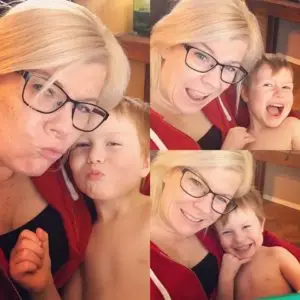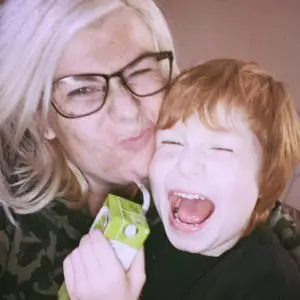*This story contains statements from a healthcare provider regarding a Klinefelter syndrome diagnosis that may upset some readers. Please read with caution.
A new baby:
 Beth Tamney lives with her family in Saskatoon, Canada. She’s the mother of two, including Simon, who is six. In many ways, Simon is like any other boy his age. He enjoys gaming, hanging out with friends, and being around his mom. However, there’s something unique about Simon. He has an extra X chromosome, known as 47, XXY, or Klinefelter syndrome.
Beth Tamney lives with her family in Saskatoon, Canada. She’s the mother of two, including Simon, who is six. In many ways, Simon is like any other boy his age. He enjoys gaming, hanging out with friends, and being around his mom. However, there’s something unique about Simon. He has an extra X chromosome, known as 47, XXY, or Klinefelter syndrome.
Beth was excited and nervous about her pregnancy. After a previous pregnancy loss and difficulty conceiving, there was some anxiety about this new baby. When Beth got unexpected news about her unborn son, she was determined to do everything she could to meet him.
Diagnosis:
Beth had no idea she was carrying an extraordinary baby until she opted for non-invasive prenatal testing (NIPT) at ten weeks pregnant. With a history of loss, the doctor recommended the NIPT to ensure everything was healthy with her developing baby. She wanted to know the sex, so she looked forward to that result from the early testing.
While at an appointment, her fertility doctor gave Beth the results. In a very calm way, she told Beth she was expecting a boy who could have an extra X chromosome. Beth left with a possible diagnosis of 47, XXY, but was unclear about what it meant.
 Quality of life:
Quality of life:
Unlike most parents who receive a potential diagnosis of 47, XXY, Beth had heard of Klinefelter syndrome before. While she didn’t know many details, she was comforted that it wasn’t a more severe condition. It wouldn’t make her unborn son incompatible with life or seriously impact his quality of life.
Beth called her husband to share the news. She was optimistic about the prognosis and said, “It’s no big deal. He has an extra X chromosome, but it’s ok. Everything’s fine.” Although the parents initially felt at peace with the diagnosis, a visit with her OB/GYN proved to be more unsettling.
A shocking response:
At a follow-up appointment a week later, Beth was shocked by her doctor’s response to the NIPT results. The provider entered the room with the results and bluntly informed Beth her son would be “mentally retarded”. She added that Beth needed to see a genetic counselor immediately to “discuss termination options.” The provider believed termination was the most viable option.
Beth was shocked by the callous way the provider discussed her baby’s potential diagnosis. In the week since learning of the diagnosis, Beth connected with the Klinefelter syndrome community on social media and did research. While still surprised and scared, it wasn’t something Beth thought should result in ending a much-wanted pregnancy.
 An ill-informed provider:
An ill-informed provider:
It seemed as though the provider’s rigid stance on Klinefelter syndrome was extreme and perhaps not well-informed. Although Beth didn’t feel pressured to terminate, she also felt the provider’s delivery might’ve swayed someone who hadn’t had a chance to do their research.
The provider offered to arrange an appointment with a genetic counselor, which Beth declined. It didn’t seem like a genetic counselor would provide anything further. After years of fertility struggles, there was “no freaking way” she would terminate her pregnancy. She was determined to have her baby boy.
Pregnancy:
 Although confident in her decision to continue the pregnancy, Beth experienced grief and fear. The possible diagnosis hung over her like a gray cloud. She “thought about it all time,” and the diagnosis “really marred the pregnancy.”
Although confident in her decision to continue the pregnancy, Beth experienced grief and fear. The possible diagnosis hung over her like a gray cloud. She “thought about it all time,” and the diagnosis “really marred the pregnancy.”
The unknowns about her son’s future weighed heavily on her. Of all the possible symptoms, she was particularly bothered by the possibility of him being infertile and unable to have children. Beth wondered if he’d get married or if infertility would prevent him from having a healthy relationship. Her heart felt broken for a little boy she hadn’t met yet, and what could happen to him. As Klinefelter syndrome is on a spectrum, there’s no way to know how significantly impacted their child would be until after birth. As her pregnancy progressed, Beth connected with the Klinefelter syndrome community. She talked to other men, met parents raising boys with an extra X chromosome, and saw it would be ok.
Advice to other mothers:
 If Beth had to offer advice to other mothers receiving a prenatal Klinefelter syndrome diagnosis for her son, it would be not to let it ruin the pregnancy. Even though she knew it wasn’t a terminal condition, the diagnosis was always on her mind. Now, as an administrator for a parents’ group for children with Klinefelter syndrome on Facebook, she encourages other mothers not to fixate on the diagnosis.
If Beth had to offer advice to other mothers receiving a prenatal Klinefelter syndrome diagnosis for her son, it would be not to let it ruin the pregnancy. Even though she knew it wasn’t a terminal condition, the diagnosis was always on her mind. Now, as an administrator for a parents’ group for children with Klinefelter syndrome on Facebook, she encourages other mothers not to fixate on the diagnosis.
As someone raising a child with Klinefelter syndrome, Beth doesn’t feel like a diagnosis of 47, XXY is something to terminate a pregnancy over. As with any pregnancy, there are no guarantees. Any child could have other health-related issues, disabilities, addictions, or mental health issues. Regarding receiving a prenatal diagnosis, there’s a glimpse into the future. Parents who receive a diagnosis know what could be coming down the road for their son and therefore get a chance to prepare.
Living With XXY:
Beth added that having a baby with Klinefelter syndrome “isn’t the end of the world.” She learned that “the boys consistently have unique skills and abilities by connecting with other parents. A lot of them are knowledgeable. If there are other issues, you can deal with them; they are awesome kids. They’re sweet, engaging, and have this cherubic essence. It’s like a spark.” She added, “Maybe it’s from having to overcome stuff, but it gives them this resilience.”
What she would want healthcare providers to know:
 When asked what she would want healthcare providers to know about caring for individuals with Klinefelter syndrome, Beth felt they should “research it before they treat people.” She also would like to see medical professionals keeping up to date with research and putting more trust in the parents of those raising Klinefelter syndrome boys. Even though doctors interact with myriads of different disorders, Beth felt they should “trust the people in the trenches.” While they may not be experts, they are often quite knowledgeable and have insights to share.
When asked what she would want healthcare providers to know about caring for individuals with Klinefelter syndrome, Beth felt they should “research it before they treat people.” She also would like to see medical professionals keeping up to date with research and putting more trust in the parents of those raising Klinefelter syndrome boys. Even though doctors interact with myriads of different disorders, Beth felt they should “trust the people in the trenches.” While they may not be experts, they are often quite knowledgeable and have insights to share.
Beth had two wishes when she reflected on the diagnosis. She wished the genetic specialist had vetted websites and resources beforehand rather than referring her to Google. She also regretted that the first thing her OB/GYN did was to offer a termination. Beth wished they had given her other options before termination was even on the table. In her words, termination should have been given “as an option, not an assumption.”
Beth is happy to donate her time to help raise awareness about Klinefelter syndrome. You can contact her on social media if anyone would like to connect. She spends hours on the phone with newly diagnosed parents, answering their questions and offering reassurance.




Thank you Beth for sharing if only I could have known so long ago.